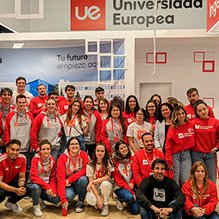-15% Discount on tution fee. Only until July 31st!
The Master in International Relations in Valencia is a 9-month programme designed to equip students with the skills and knowledge to succeed in the world of international politics, whether that be in government bodies, NGOs, or other international organisations.
The Master in International Politics has been designed and is taught by leading experts in their field. The curriculum covers many areas of the complex issues of international relations today, such as diplomacy, conflict resolution, and foreign policy. With an eminently practical approach, over the course of the programme, which consists of 60 ECTS, you will have the chance to complete work placements at embassies, NGO’s and international organisations, gaining real-world experience and improving key skills such as communication, leadership and strategic thinking.
Private degree issued by Universidad Europea de Valencia
| Campus-based | Classes in English | Valencia | 10 months, 60 ECTS | Start: 17 oct. 2025 | School of Social Sciences and Communication |
91%
Our students find employment in less than 12 months.
55%
You'll live in a diverse environment that is more multicultural than that of other universities.
3.600
UEV has a multitude of educational cooperation agreements with other centres.
Students carry out a practical exercise simulating UN procedures in a debate held on UN premises.
Students carry out a practical exercise simulating UN procedures in a debate held on UN premises.
MODULE | SUBJECT | CREDITS |
MODULE 1 | GEOPOLITICS AND GEOECONOMICS: STATE-OF-THE-ART | 12 |
1.1. | Advanced Geopolitics | 6 |
1.2. | Advanced Geoeconomics | 6 |
MODULE 2 | SOFT SKILLS FOR SUSTAINABLE LEADERSHIP | 12 |
2.1. | Analytical skills - decision making skills | 4 |
2.2. | Problem-solving skills - Conflict Resolution | 4 |
2.3. | Adaptability - Creativity | 3 |
2.4. | Case of (Poli)Crisis Management | 1 |
MODULE 3 | STRATEGIES AND TACTICS | 12 |
3.1. | Workshop of International Negotiations | 5 |
3.2. | Security and Defense: (re)organizations | 5 |
3.3. | UN Simulation | 2 |
MODULE 4 | KEY REGIONAL APPROACHES | 12 |
4.1. | Chinese and Indian Challenges | 3 |
4.2. | South Global vs.West | 3 |
4.3 | Middle East and Latam: new actors, new stakes | 3 |
4.4 | Europe with or without US | 3 |
MODULE 5 | DIPLOMACY 360º | 12 |
5.1. | Digital Diplomacy and Artificial Intelligence | 3 |
5.1. | Sustainability Diplomacy | 3 |
5.1. | Humanitarian Diplomacy | 3 |
5.2 | Scientific Diplomacy | 2 |
MODULE 6 | TFM | 6 |
6 | Master's thesis with international jury | 6 |
Internships are a key component of your training. Acquiring experience after what you have learnt in your degree programme is the best way to enter the employment market. There are two types of internships: curricular—which are included in your study plan—and extracurricular—which you can do on a voluntary basis.
In order to complete curricular internships in companies, you will need to have 50% of the credits approved and to register the subject before starting your internship. These internships are monitored by the company and the internship coordinator, and they are evaluated by midterm and final reports.
If you want to take your work experience to the next level before finishing your university education, you can pursue an extracurricular internship. You can do them in any academic year, but keep in mind that internships are a formative complement to your studies; therefore, the more knowledge you have acquired throughout your studies, the more you will benefit from the internship experience.
A Master's Degree in International Relations can open up a wide variety of career opportunities, as it prepares graduates for roles involving international affairs, diplomacy, political analysis and other related fields.
Diplomacy and foreign service.
International organisations.
Non-Governmental organisations (NGOs).
Policy analysis and consultancy.
International trade and economic development.
International security.
International journalism.
Education and research.
Multinational companies.
Conflict resolution and peacebuilding.
Start your future at Universidad Europea
You can become a student at Universidad Europea in three easy steps.
1
Start your admission process by calling +34 961043883 or request information and our advisors will contact you.
2
Once you have been admitted, secure your place by paying the reservation fee.
3
Submit the required documents to formalise your enrollment.
Start your future at Universidad Europea
You can become a student at Universidad Europea in three easy steps.
1
Start your admission process by calling +34 922097091 or request information and our advisors will contact you.
2
Once you have been admitted, secure your place by paying the reservation fee.
3
Submit the required documents to formalise your enrollment.

Get to know the facilities and discover why Universidad Europea is made for you.